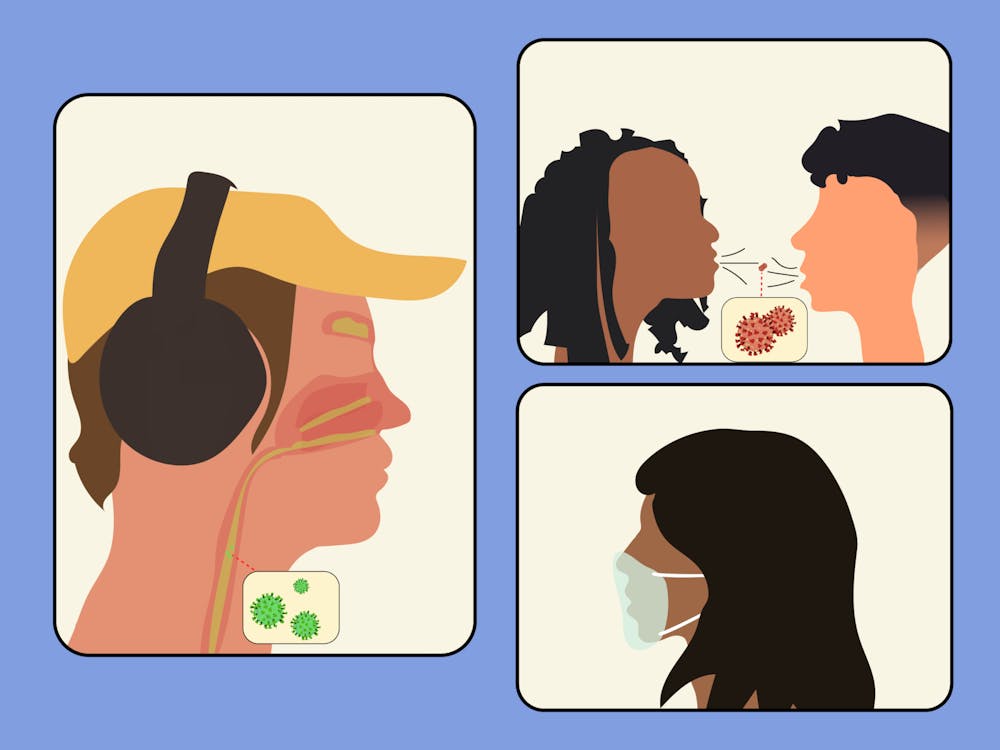When UF business administration senior Julianna Ciccantelli returned for the Fall semester, she prepared for two things: her classes and sinus infections.
“I am very prone to getting them,” Ciccantelli said. “Especially when the seasons change and whenever I move back into the dorms when coming back up to UF.”
The 22-year-old experiences symptoms like fatigue, postnasal drip and congestion for up to three weeks when she gets a sinus infection. Despite the frustrations that come with getting sick, she said it is inevitable for UF students.
“Everyone is bound to catch something at the start of the school year,” Ciccantelli said.
A few weeks into the Fall semester, countless UF students are getting sick with various viruses, including the common cold and the latest COVID-19 strain, resulting in an outbreak of what has been dubbed as the 'Gainesville Plague'.
On-campus resources
Jocelyn Gravlee is the director of UF’s Student Health Care Center, which offers a Fast Track clinic on its second floor that sees patients with acute upper respiratory symptoms and same-day testing for illnesses like the flu.
“Our mission is to help every UF student achieve optimal health in the pursuit of personal and academic success,” Gravlee said.
Gravlee said viruses are common on college campuses, and flu season runs from mid-fall through spring. September and October remain the best times for most people to get their flu vaccine, according to the Centers for Disease Control and Prevention.
“However, it is not uncommon to see students with influenza this time of year,” she said. “There is nothing unique about Gainesville and [its] cold season.”
The most recent Florida Department of Health report showed that Alachua County and other Florida counties’ flu rates were rising. Gravlee encourages students to stay home if they have a fever to limit the spread of infection.
Symptoms and remedies
There are many similarities between symptoms of common colds, the flu and COVID-19, Jeb Justice, UF Chief of Rhinology and Skull Base Surgery and associate professor of Otolaryngology, said. These parallels include fatigue, cough, nasal congestion and facial pressure.
However, COVID-19 typically comes with a dry cough, while a common cold and the flu do not, according to the Mayo Clinic.
Justice said sinus infections often arise from having one of these viruses.
“A true sinus infection…[comes] five to seven days after getting a common cold or having really bad environmental allergies,” Justice said. “If you have underlying allergies, that can predispose you to sinus infections.”
More than 20 million Americans will have at least one episode of sinusitis this year, according to Harvard Health.
Justice recommends students use Afrin nasal spray for sinus infections to aid with breathing and sleep during sickness, with a warning to not use it for more than three days to avoid addiction to the spray.
The American Academy of Allergy, Asthma, and Immunology also limits Afrin use to three days.
Justice also advises students to try nasal irrigation to reduce congestion.
“A lot of people will do nasal irrigations with either a neti pot or some sort of squeeze bottle,” Justice said. “You want to make sure you use distilled water… [it is] the safest way because the tap water can actually have microbes in it.”
Some students turn to more holistic remedies to avoid getting sick.
Genesis Soto-Alfonso, a UF microbiology sophomore, said they have started taking multivitamins and supplements to strengthen their respiratory system and prevent illness.
“In my first year at UF, I would basically get sick every couple of weeks,” they said. “I have much less congestion as well as coughing less [now].”
Mullein leaf and calcium magnesium zinc are among the supplements Soto-Alfonso includes in their daily routine.
COVID-19 updates
Although the CDC ended the federal declaration of COVID-19 as a Public Health Emergency in early May, the agency’s most recent statement said annual community outbreaks of COVID-19 infections will typically occur during late fall and winter.
The newest variant is BA2.86, which has been given the unofficial nickname Pirola, Jerne Shapiro said.
Jerne Shapiro, an instructional assistant professor in the department of epidemiology, was UF’s Lead Epidemiologist for its COVID-19 response and worked with the Alachua County Health Department to control the disease’s spread.
The Florida Department of Health reported 23,960 overall cases of COVID-19 in the state of Florida. There were 70 new COVID-19 hospital admissions in Alachua County in the past week, according to the CDC.
“This variant is not what is currently driving the increase in hospitalizations being seen across the U.S.,” Shapiro said. “Instead, it is being caused by other predominantly circulating viruses.”
Early research shows that the COVID-19 vaccine and existing antibodies are effective against the BA2.86 variant. Still, Shapiro said it is important to wear a well-fitting mask such as a N-95 if you decide to wear one.
“Cloth or surgical masks are ineffective, as the virus is too small and can go through the gaps,” Shapiro said.
UF students have already started to test positive for COVID-19 this semester.
Maite Chapartegui, a 19-year-old UF computer science sophomore, said she only became concerned about having COVID-19 after one of her roommates tested positive.
“My symptoms before testing positive were congestion and sneezing, but I brushed it off as allergies,” Chapartegui said. “I typically get really bad allergies every day, and I am almost always congested.”
Mild symptoms of COVID-19 may present similarly to allergies, according to the Mayo Clinic.
UF students and employees with compromised immune systems should get vaccinated with the new booster vaccine that becomes available next week, Shapiro said. Students, faculty and staff can receive vaccines and boosters from the SHCC and UF Health pharmacies at no cost.
Contact Jinelle at jvazquez@alligator.org. Follow them on Twitter @vazquezjinelle.
Jinelle Vazquez is a senior at UF pursuing a major in Public Health with a minor in Indigenous Studies. They currently report for the enterprise desk covering health. In their free time, they enjoy hiking, photography and making art.






